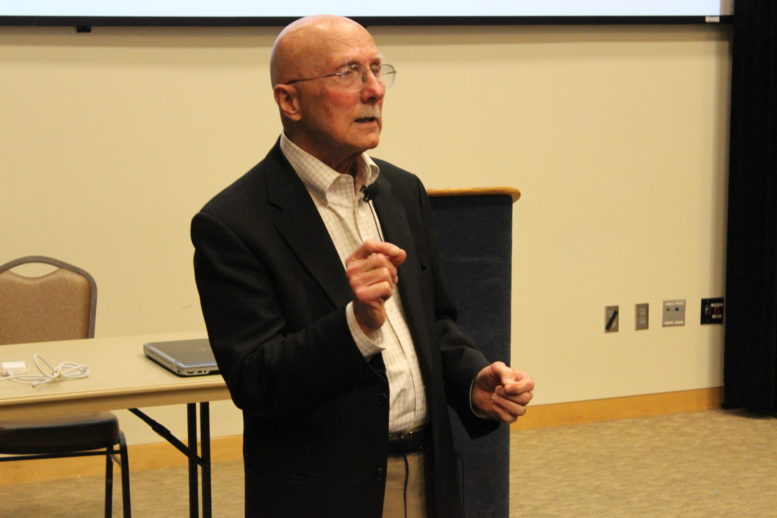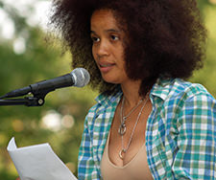By DAVID DUPONT
BG Independent News
The tide has turned against carbon-based fuels.
That could help assuage the worst effects of global warming that could flood major cities as ocean levels rise and fresh water becomes scarce in the more arid interior.
Dr. Henry Pollack, an emeritus professor of geophysics at the University of Michigan, said that the story of alternative energy competing with oil and coal was once perceived as a David vs. Goliath scenario. “The test in front of us,” he told an audience last week at Bowling Green State University, “is to reduce Goliath to David’s level.” That now seems to be happening.
In 2010, he said, for the first time investment in alternative fuels, including wind, biofuels, hydrogen fuel cells, fusion and nuclear, outpaced investment in the oil, gas and coal industries. That year $187 billion was invested in alternative fuels compared to $157 billion in fossil fuels. Five years later, he said, investment in alternative fuels had grown by almost $100 billion, while investment in carbon-based technologies had dropped to $130 billion.
“I’m telling you we’re at the tipping point,” Pollack said. “Carbon fuels are on the way down and out.”
He urged the audience “to follow the money,” and then told the tale through international headlines.
The nation’s two largest coal companies have declared bankruptcy. The last deep-pit coal mine in the United Kingdom has closed. The stock price of coal companies is dropping.
Saudi Arabia is considering selling its state-owned oil company Aramco. The United States has lifted its 40-year ban on exporting oil. The reasoning being, he said, “let’s let them sell it while they can get something for it.”
The dropping price of oil is threatening the budgets in fossil fuel dependent states Alaska and Wyoming, and prompting fears of future bankruptcies on Wall Street.
Now, he said, conventional wisdom is that the price of oil is cyclical, and therefore will rise. Pollack said that thinking is wrong.
Events like “tremendous instability in the Middle East,” which in the past have pushed up the price of oil, have had no effect. And oil producing nations failed to agree to cut production.
Even with falling oil prices, car manufacturers are still pushing ahead with the development of electric vehicles.
“This is the shifting of capital away from carbon to renewables,” he said. This transition is taking place “much faster than anyone anticipated.”
He likened the growth of renewable technologies to the growth of digital communications. Even those involved in the early wireless phones failed to predict how quickly they would dominate the market.
Pollack said on the flip side, the fall in value for coal, gas and oil related stocks is creating fears of a $28 trillion write-down in their value. They have become stranded assets the same as mortgage backed securities did in 2008. Worthless.
Pollack noted that the Chinese character for crisis is a combination of the symbols for danger and opportunity. That’s what the world faces. Confronting the danger of climate change also gives rise to the possibility of innovation.
“We see this transition accelerate dramatically,” Pollack said. “The countries of the world that seize that opportunity and move quickly to take advantage of it… will be the winners of the 21st century.”
In the first half of Pollack’s talk, he made clear that climate change must be addressed. Pollack was one of 2,000 authors of the massive report by the 2007 Intergovernmental Panel on Climate Change. That means he has a 1/2000th share in the Nobel Peace Prize the report received.
Pollack moved through the climate data, pointing to irrefutable proof that the world is warming and that human activity is the cause.
Yes, he said, carbon in the atmosphere can occur naturally, but “we’re far out of the range.”
While burning fossil fuels caused an economic boon, “it has led to an inadvertent change in the earth’s climate.”
Of the hottest 15 years on record, 14 have occurred in the 21st century, and 2015 was the hottest since record keeping started in 1880.
If continued unabated this will lead to more extreme and severe weather, rising seas and droughts.
A range of ways to address climate change exist including taxing companies for using the atmosphere “as an open sewer” for carbon to growing more trees.
At the Paris Accords in December, Pollack said, participants agreed on the goal to keep the global temperature increase to no more than 3.6 degree Fahrenheit.
To reach that, each nation needs to come up with a plan, report on its progress, and maintain transparent records.
The cost of this will fall on developed countries since undeveloped countries did not cause the problem, he said.
The plan also calls for increased reforestation. Trees are important because they absorb carbon and store it, preventing it from going into the atmosphere. Pollack is skeptical of attempts to mechanically capture and store carbon, saying to date none of the experiments have been successful.
The three largest producers of carbon, China, the United States and the European Union, account for 70 percent of the emissions. All made pledges to reduce those emissions. But they were modest pledges designed to be easily achieved. These pledges “are not adequate,” Pollack said.
This was a choice, he said. If they can show in five years they’ve met these goals, then they can advocate for doing even more.
Reducing carbon emissions can be achieved in other ways.
Controlling population would help. Global population is expected to reach 8 billion by 2020 and could rise to 10 billion by the end of the century. Everyone “likes to eat and stay warm in winter, and cool in summer.”
He also advocated looking for “the low-hanging fruit.”
“Quit wasting energy,” Pollack said. Promoting energy efficiency “has an immediate economic impact.”
“The cheapest energy is the energy you don’t use.”





